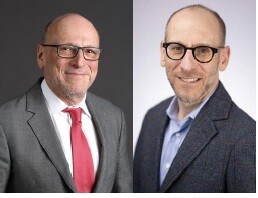Breadcrumbs
- Home
- About Us
- Message from the Executive Liaison Committee
Message from the Executive Liaison Committee

It may sound repetitive, but once again we are pleased to share that it has been a wonderful and productive year for SREMI. The major highlight for us was the successful execution of a new Collaboration Agreement between our founding partners, North York General Hospital and Sinai Health. The process itself was a very constructive exercise and was an opportunity to clearly articulate the goals, vision and value of the partnership while updating and clarifying each site’s commitments. This renewed agreement sets the stage for even stronger collaboration and continued achievements in the years ahead.
North York General leaders, Dr. Kevin Wasko and Andrea Ennis, led the planning for EDAC 2024, our national Emergency Department Administration Conference. This marked our return to a fully in-person event after the pandemic and five virtual versions. Held in December 2024, the conference was a complete sell-out, buzzing with energy as participants relished the chance to connect face-to-face, learn from one another, and engage with our outstanding speakers. With participants from across Canada, EDAC 2024 was a very tangible example of SREMI’s leadership in our discipline. Kevin and Andrea are once again leading the planning for this year’s event, and we are confident it will be another sold out and amazing meeting.
We’ve previously commented on the important work SREMI and Dr. Shelley McLeod perform in evaluating public policy related to emergency services in Ontario. Although not yet announced publicly, Shelley has secured another grant from Ontario Health to conduct an evaluation of a controversial but innovative strategy being used in several Ontario EDs, giving select patients the option to schedule their ED visit.
SREMI was founded on a vision of synergy between research, knowledge translation, advocacy and leadership in emergency medicine. Another example of this vision in action is the work of SREMI clinician scientist Dr. Keerat Grewal, whose research explores the experiences and outcomes of patients who have a new cancer diagnosis during an ED visit. Her original research has led to many invited presentations, media coverage, and opportunities to lead or participate in quality improvement initiatives. She has developed a reputation as THE expert in this important area.
The collective impact of SREMI is evident by the huge presence of SREMI faculty at national and international conferences. At the International Conference in Emergency Medicine (ICEM) in Montreal in June and the European Society of Emergency Medicine (EUSEM) conference in Vienna in October, SREMI faculty delivered multiple invited talks and presented a wide range of abstracts. These and many other accomplishments speak to the tremendous leadership provided by Bjug, Catherine and Shelley. Together, and through their support of each other, they not only provide effective mentorship to their colleagues, but also serve as tremendous role models through their own research excellence and leadership to our discipline in too many ways to enumerate.
We are eternally grateful to our hospitals for their support, and to our donors. Public funding for emergency medicine scholarship is insufficient to maintain dynamic programs like SREMI. The partnership with our Foundations, and our visionary founding donors Gerald Schwartz and Heather Reisman make all of this possible. We are excited to build on our renewed partnership and will continue to put SREMI’s bold vision into action in the coming year.
